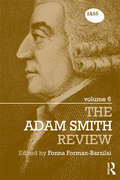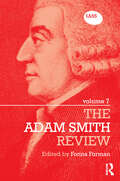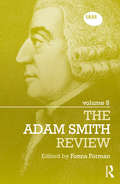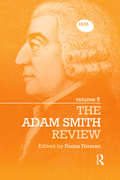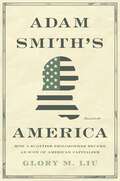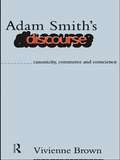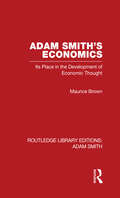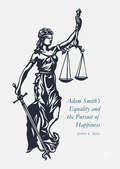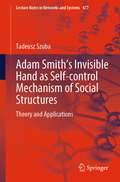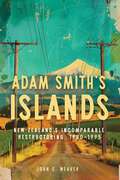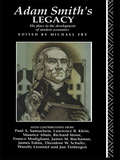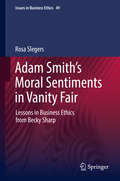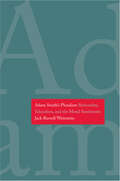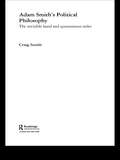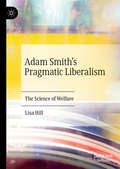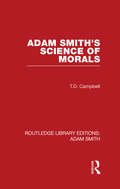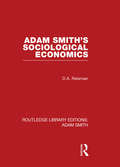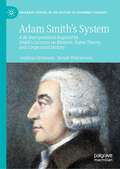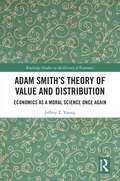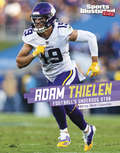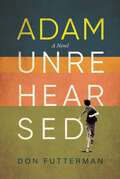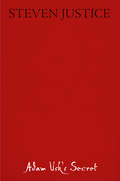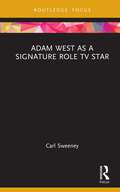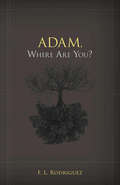- Table View
- List View
The Adam Smith Review, Volume 6 (The\adam Smith Review Ser. #6)
by Fonna Forman-BarzilaiAdam Smith’s contribution to economics is well-recognized but in recent years scholars have been exploring anew the multidisciplinary nature of his works. The Adam Smith Review is a refereed annual review that provides a unique forum for interdisciplinary debate on all aspects of Adam Smith’s works, his place in history, and the significance of his writings to the modern world. It is aimed at facilitating debate between scholars working across the humanities and social sciences, thus emulating the reach of the Enlightenment world which Smith helped to shape. The sixth volume of the series contains contributions from specialists across a range of disciplines, including Vivienne Brown, Maria Alejandra Carrasco, Douglas J. Den Uyl, John Elster, Niall Ferguson, Samuel Fleischacker, Christel Fricke, Lisa Hill, Duncan Kelly, Karl Ove Moene, John O’Neill, Maria Pia Paganelli, Alessandro Roncaglia, Carola Freiin von Villiez, and Jonathan B. Wight. Topics examined include: Smith and the conditions of a moral society The fate of Anglo-American capitalism Smith and Shaftesbury
The Adam Smith Review Volume 7: Volume 11 (The Adam Smith Review #11)
by Fonna FormanAdam Smith’s contribution to economics is well-recognised but in recent years scholars have been exploring anew the multidisciplinary nature of his works. The Adam Smith Review is a refereed annual review that provides a unique forum for interdisciplinary debate on all aspects of Adam Smith’s works, his place in history, and the significance of his writings to the modern world. It is aimed at facilitating debate between scholars working across the humanities and social sciences, thus emulating the reach of the Enlightenment world which Smith helped to shape. The seventh volume of the series contains contributions from specialists across a range of disciplines, including Christopher Berry, Maureen Harkin, Edith Kuiper, N.B. Leddy, Catriona Seth, Henry C. Clarke, Deidre Dawson, Dionysios Drosos, Ioannis A.Tassopoulos, Jeremy Jennings, Ryan Patrick Hanley, Fotini Vaki, Spiros Tegos, Nicholas J. Theocarakis, Chandran Kukathas, Donald Winch, Fonna Forman, Craig Smith, Nicholas Phillipson, Chad Flanders, Emily Nacol, Andrea Radasanu, Rachel Zuckert, Michael L. Fraser, Ian S. Ross, Daniel B. Klein, Douglas J. Den Uyl, James A. Harris, Geoffrey Kellow, Paul Dumouchel, Jan Horst Keppler, Paul Oslington, Adrian Walsh, Spencer J. Pack, and Dennis C. Rasmussen. Topics examined include: Smith and Women Adam Smith in Greece Nicholas Phillipson's Adam Smith: An Enlightened Life Michael L. Fraser's The Enlightenment of Sympathy: Justice and the Moral Sentiments in the Eighteenth Century and Today
The Adam Smith Review Volume 8: Volume 11 (The Adam Smith Review #6)
by Fonna FormanAdam Smith’s contribution to economics is well-recognised, but in recent years scholars have been exploring anew the multidisciplinary nature of his works. The Adam Smith Review is a refereed annual review that provides a unique forum for interdisciplinary debate on all aspects of Adam Smith’s works, his place in history, and the significance of his writings to the modern world. It is aimed at facilitating debate between scholars working across the humanities and social sciences, thus emulating the reach of the Enlightenment world which Smith helped to shape. The eighth volume of the series contains contributions form a multidisciplinary range of specialists, including Fonna Forman, Ryan Patrick Hanley, Dionysis Drosos, Matti Norri, Adelino Zanini, Cesare Cozzo, Estrella Trincado, Michaël Biziou, Carsten Herrmann-Pillath, Heinrique Schnieder, The Right Honorable Gordon Brown, Gavin Kennedy, Iain McLean, Vernon Smith, Alan Lopez, John Thrasher, Tom Martin, Brian Glenney, Şule Özler, Paul A. Gabrinetti, Craig Smith, Michelle A. Schwarze, Edwin van de Haar, Farhad Rassekh, Lauren Brubaker, Gordon Graham and Eric Schliesser. Themes of the volume include: Translating Smith’s Theory of Moral Sentiments Smith and China Adam Smith in Kirkcaldy
The Adam Smith Review: Volume 9 (The Adam Smith Review)
by Fonna FormanAdam Smith’s contribution to economics is well-recognised, but in recent years scholars have been exploring anew the multidisciplinary nature of his works. The Adam Smith Review is a rigorously refereed annual review that provides a unique forum for interdisciplinary debate on all aspects of Adam Smith’s works, his place in history, and the significance of his writings to the modern world. It is aimed at facilitating debate between scholars working across the humanities and social sciences, thus emulating the reach of the Enlightenment world which Smith helped to shape. This ninth volume brings together leading scholars from across several disciplines to consider topics as diverse as Smith’s work in the context of scholars such as Immanuel Kant, Yan Fu and David Hume, Smith as the father of modern economics, and Smith’s views on education and trade. This volume also has a particular focus on Asia, and includes a section that presents articles from leading scholars from the region.
Adam Smith’s America: How a Scottish Philosopher Became an Icon of American Capitalism
by Glory M. LiuThe unlikely story of how Americans canonized Adam Smith as the patron saint of free marketsOriginally published in 1776, Adam Smith&’s The Wealth of Nations was lauded by America&’s founders as a landmark work of Enlightenment thinking about national wealth, statecraft, and moral virtue. Today, Smith is one of the most influential icons of economic thought in America. Glory Liu traces how generations of Americans have read, reinterpreted, and weaponized Smith&’s ideas, revealing how his popular image as a champion of American-style capitalism and free markets is a historical invention.Drawing on a trove of illuminating archival materials, Liu tells the story of how an unassuming Scottish philosopher captured the American imagination and played a leading role in shaping American economic and political ideas. She shows how Smith became known as the father of political economy in the nineteenth century and was firmly associated with free trade, and how, in the aftermath of the Great Depression, the Chicago School of Economics transformed him into the preeminent theorist of self-interest and the miracle of free markets. Liu explores how a new generation of political theorists and public intellectuals has sought to recover Smith&’s original intentions and restore his reputation as a moral philosopher.Charting the enduring fascination that this humble philosopher from Scotland has held for American readers over more than two centuries, Adam Smith&’s America shows how Smith continues to be a vehicle for articulating perennial moral and political anxieties about modern capitalism.
Adam Smith's Discourse: Canonicity, Commerce and Conscience
by Vivienne BrownAdam Smith's name has become synonymous with free market economics; The Wealth of Nations is taken as the definitive account of the benefits of free competitive markets. Yet recent scholarship has challenged this view and given us a richer, more nuanced figure, steeped in the intricacies of enlightenment social and political philosophy. Adam Smith's Discourse both develops this literature and gives it a radical new extension by taking into account recent debates in literary theory.
Adam Smith's Economics: Its Place in the Development of Economic Thought (Routledge Library Editions: Adam Smith)
by Maurice BrownThe conventional received opinion of Adam Smith as an isolated figure, the founder of ‘modern’ economics, is thoroughly mistaken and misleading. This is the central premise of this book, first published in 1988, in which the author argues that by placing Smith’s work in its historical context, we discover profound continuities between Smith’s work and that of his predecessors, and his contemporaries. The effect is to re-orientate our perception of Smith and his achievement. No longer the single-handed champion of free markets and competition whose work revolutionised and completely redirected economics. He appears instead as a brilliant contributor to a deep-rooted contemporary debate, someone who can be placed in a line of thinkers that stretches between Machiavelli and Kant.
Adam Smith’s Equality and the Pursuit of Happiness
by John E. HillThis book examines Adam Smith's main principles in Wealth of Nations as the basis for effective policymaking. Adam Smith wanted to increase happiness through this formula for a good life: equality, liberty, and justice. Free market interpretations of Smith, the book argues, grossly misrepresent his thought, emphasizing only liberty and not also equality and justice. This book suggests policies that combine all three in order for happiness to be maximized.
Adam Smith’s Invisible Hand as Self-control Mechanism of Social Structures: Theory and Applications (Lecture Notes in Networks and Systems #477)
by Tadeusz SzubaThis book shows how such a computational process functions, how great is its power and versatility, since it is possible to show how discoveries are made. In 1759, A. Smith realized that there must exist an additional powerful control mechanism behind Great Britain’s authority and government, explaining the extraordinary successes of Great Britain. He called this the Invisible Hand. Despite having used this term only 3 times, the idea evokes extreme scientific and political emotions to this day. If we apply a molecular model of computation, such as in in Adleman’s DNA computer, a computational model for the Invisible Hand can be built to show how it affects a society. It is a spontaneous, unconscious, distributed, noncontinuous computational process on the platform of minds of, e.g., people or ants. Knowing this mechanism, a future self-steering and self-optimization system for AI robot teams can be proposed, e.g., for construction sites and rescue operations.
Adam Smith’s Islands: New Zealand’s Incomparable Restructuring, 1980–1995
by null John C. WeaverMany developed countries restructured relations between state and economy from the late 1970s into the 1990s. Among them, New Zealand went far, fast, and left a clear trail, making it possible to study economic restructuring as it occurred, with all the debates, uncertainty, surprises, mistakes, and accomplishments this entailed. Adam Smith’s Islands reveals the inside life of a government determined to revolutionize its nation’s politics and economy.While the 1980s economic restructuring of members of the Organisation for Economic Co-operation and Development and former Warsaw Pact countries can seem like a foregone conclusion from the vantage point of the twenty-first century, John Weaver examines how local and global institutions had to come together to implement social adjustments in New Zealand. Mounting evidence that the state had not functioned as an effective manager split the business community and primary producers between defenders of subsidization and free-market insurgents. Reforms undertaken by the governing Labour Party included abandoning currency controls, privatizing state-run businesses, ending a multitude of open and disguised subsidies, tightening fiscal responsibility, and reforming taxation. Adam Smith’s Islands focuses on the verifiable: direct primary sources from dozens of state collections and deposits of personal papers. The archival cornucopia informing this history supports a narrative that has little in common with intellectual histories of neoliberalism. To understand how the relationship between the economy and the state changed, we need to grasp how and why core institutions, practices, and cultural beliefs shed some of their once potent legitimacy.Through the lens of New Zealand, Adam Smith’s Islands examines larger questions about policy dilemmas, the global flow of capital, and the sustainability of social adjustments in economic restructuring. In so doing, it casts new light on the formation and history of what is casually labelled today as the neoliberal state.
Adam Smith's Legacy: His Place in the Development of Modern Economics
by Michael FryFirst published in 1992. Routledge is an imprint of Taylor & Francis, an informa company.
Adam Smith’s Moral Sentiments in Vanity Fair: Lessons in Business Ethics from Becky Sharp (Issues in Business Ethics #49)
by Rosa SlegersAccording to Adam Smith, vanity is a vice that contains a promise: a vain person is much more likely than a person with low self-esteem to accomplish great things. Problematic as it may be from a moral perspective, vanity makes a person more likely to succeed in business, politics and other public pursuits. “The great secret of education,” Smith writes, “is to direct vanity to proper objects:” this peculiar vice can serve as a stepping-stone to virtue. How can this transformation be accomplished and what might go wrong along the way? What exactly is vanity and how does it factor into our personal and professional lives, for better and for worse?This book brings Smith’s Theory of Moral Sentiments into conversation with William Makepeace Thackeray’s Vanity Fair to offer an analysis of vanity and the objects (proper and otherwise) to which it may be directed. Leading the way through the literary case study presented here is Becky Sharp, the ambitious and cunning protagonist of Thackeray’s novel. Becky is joined by a number of other 19th Century literary heroines – drawn from the novels of Jane Austen, Charlotte Brontë and George Eliot – whose feminine (and feminist) perspectives complement Smith’s astute observations and complicate his account of vanity. The fictional characters featured in this volume enrich and deepen our understanding of Smith’s work and disclose parts of our own experience in a fresh way, revealing the dark and at times ridiculous aspects of life in Vanity Fair, today as in the past.
Adam Smith's Pluralism
by Jack Russell WeinsteinIn this thought-provoking study, Jack Russell Weinstein suggests the foundations of liberalism can be found in the writings of Adam Smith (1723#150;1790), a pioneer of modern economic theory and a major figure in the Scottish Enlightenment. While offering an interpretive methodology for approaching Smith's two major works, The Theory of Moral Sentiments and The Wealth of Nations, Weinstein argues against the libertarian interpretation of Smith, emphasizing his philosophies of education and rationality. Weinstein also demonstrates that Smith should be recognized for a prescient theory of pluralism that prefigures current theories of cultural diversity.
Adam Smith's Political Philosophy: The Invisible Hand and Spontaneous Order (Routledge Studies in Social and Political Thought #Vol. 42)
by Craig SmithWhen Adam Smith published his celebrated writings on economics and moral philosophy he famously referred to the operation of an 'invisible hand'. Adam Smith’s Political Philosophy makes visible this hand by examining its significance in Smith’s political philosophy and relating it to similar concepts used by other philosophers, thus revealing a distinctive approach to social theory that stresses the importance of the unintended consequences of human action. The first book to examine the history of Smith’s political philosophy from this perspective, this work introduces greater conceptual clarity to the discussion of the invisible hand and the related notion of unintended order in the work of Smith, as well as in political theory more generally. By examining the application of spontaneous order ideas in the work of Smith, Hume, Hayek and Popper, this important volume traces similarities in approach, and from these constructs a conceptual, composite model of an invisible hand argument. While setting out a clear framework of the idea of spontaneous order, the book also builds the case for using this as an explanatory social theory, with chapters on its application in the fields of science, moral philosophy, law and government.
Adam Smith’s Pragmatic Liberalism: The Science of Welfare
by Lisa HillAdam Smith is commonly conceived as either an economist or a moral philosopher so his importance as a political thinker has been somewhat neglected and, at times, even denied. This book reveals the integrated, deeply political project that lies at the heart of Smith’s thought, showing both the breadth and novelty of Smith’s approach to political thought. A key argument running through the book is that attempts to locate Smith on the left-right spectrum (however that was interpreted in the eighteenth century) are mistaken: his position was ultimately dictated by his social scientific and economic thought rather than by ideology or principle. Through examining Smith’s political interests and positions, this book reveals that apparent tensions in Smith's thought are generally a function of his willingness to abandon, not only proto-liberal principles, but even the principles of his own social science when the achievement of good outcomes was at stake. Despite the common perception, negative liberty was not the be-all and end-all for Smith; rather, welfare was his main concern and he should therefore be understood as a thinker just as interested in what we would now call positive liberty. The book will uniquely show that Smith’s approach was basically coherent, not muddled, ad hoc, or ‘full of slips’; in other words, that it is a system unified by his social science and his practical desire to maximise welfare.
Adam Smith's Science of Morals (Routledge Library Editions: Adam Smith)
by Tom CampbellThis critical exposition of Adam Smith’s Theory of Moral Sentiments, first published in 1971, gives an appreciation of Smith’s conception of scientific method as applied to the study of social phenomena. The work is placed in the context of Smith’s other writings including of course The Wealth of Nations, but making special use of the theory of scientific development contained in his posthumous work, Essays on Philosophical Subjects. By concentrating on Smith’s methodological approach to the study of society, this book provides an illuminating interpretation of his moral theory and defends it against any mistaken criticisms. It also includes a much needed analysis of the important differences between Smith’s ‘impartial spectator’ and the ‘ideal observer’ of modern ethical society. The result is a pointed study, bringing out the close connection between his moral, legal and ethical theories, which will be welcomed by all students of 18th century thought, specialists in moral theory, and the interested lay-reader.
Adam Smith's Sociological Economics (Routledge Library Editions: Adam Smith)
by David Alexander ReismanFirst published in 1976, this book provides an interdiciplinary study fo the thoughts of Adam Smith, showing it particular how the link between economic basis and social superstructure was central to his work. The work is split into six sections, dividing Smith's views along the following lines: 'methology', 'conduct and character', 'consumer behaviour', 'the upper classes', 'the lower classes', and finally 'the State'.
Adam Smith’s System: A Re-Interpretation Inspired by Smith's Lectures on Rhetoric, Game Theory, and Conjectural History (Palgrave Studies in the History of Economic Thought)
by Andreas Ortmann Benoît WalraevensInspired by his lectures on rhetoric and by game theory, this book provides a new interpretation of Adam Smith’s system of thought. It highlights its coherence through the identification of three reasoning routines and a meta-reasoning routine throughout his work on languages, rhetoric, moral sentiments, self-command, and the nature and causes of the wealth of nations. The identification of these reasoning routines allows the authors to uncover a hitherto poorly understood deep structure of Smith’s work and to explain its main characteristics. How these routines emerged in Smith’s early research on the principles of the human mind is also traced. This book sheds new light on Adam Smith and his work, highlighting his sophisticated understanding of strategic interaction in all things rhetorical, moral, and economic. It will be relevant to students and researchers interested in the history of ideas, the history of economic thought, game theory, Enlightenment studies, and rhetoric.
Adam Smith’s Theory of Value and Distribution: Economics as a Moral Science Once Again (Routledge Studies in the History of Economics)
by Jeffrey T. YoungEver since the time of his early interpreters, beginning with David Hume, Adam Smith’s theory of value has been the subject of confusion and misunderstanding – including a controversy which still rages over whether Smith held a labour theory of value, and, if so, whether he held to it throughout Wealth of Nations, or if it was confined to the “Early and Rude State”? This book provides a close reading of Smith’s key text, and also incorporates material from the other parts of Smith’s oeuvre, especially from The Theory of Moral Sentiments, to yield original and important insights into Smith’s theory of value. The book operates on the assumption that Smith is proposing relatively simple ideas about price and takes a conventional view that simple Supply and Demand models can illuminate, clearly and consistently with his text, his theory of price. Combining these elements, the book argues that, contra Marx, Smith does not have a labour theory of value at all, understood as a theory of the determination of the relative price structure. Instead, Smith is placed squarely in the supply and demand, general equilibrium framework and the claim that he is part of a “surplus tradition”, which receives its highest treatment in the work of Piero Sraffa, is refuted. This book will be of particular interest to Adam Smith specialists, historians of economic thought, and research economists who have an interest in Smith.
Adam Smith’s Wealth of Nations
by Jerry EvenskyAdam Smith's The Wealth of Nations is regarded by many as the most important text in the history of economics. Jerry Evensky's analysis of this landmark book walks the reader through the five 'Books' of The Wealth of Nations, analyzing Smith's terms and assumptions and how they are developed into statements about economic processes in Book I, his representation of the dynamics of economics systems in Book II, and his empirical case for his model in Book III. With that framework in place, Evensky examines Smith's critique of alternative models, mercantilism and physiocracy, in Book IV, and Smith's presentation of the policy implications of his analysis presented in Book V. This guide highlights the nexus of Smith's economics and his work on ethics and jurisprudence, and in doing so Evensky sets his examination of The Wealth of Nations into a larger, holistic analysis of Smith's moral philosophy.
Adam Thielen: Football's Underdog Star (Sports Illustrated Kids Stars of Sports)
by Matt ChandlerAdam Thielen always knew he wanted to play in the NFL. From growing up watching Randy Moss and the Vikings to playing at a small Division II college, his path to the NFL hasn't always been a straight line. After initially making the Vikings roster in 2013, he was cut to the practice squad. Now, he's Minnesota's top wide receiver. Learn more about Thielen's path to football fame in this exciting biography in the Stars of Sports series.
Adam Unrehearsed
by Don FuttermanIn the vein of The Chosen, Catcher in the Rye, and The Kite Runner comes Adam Unrehearsed, a &“hilarious, deeply moving, coming-of-age comedy&” (Yossi Klein Halevi).From the moment he&’s mugged on the subway home from Bat Day at Yankee Stadium, things go wrong for twelve-year-old Adam Miller. He is in the Special Program for brainy kids, but his new junior high is on triple shift. When he gets on the wrong side of several gangs and needs them most, his friends disappear. As if that&’s not enough, Adam discovers that his older brother has become a Zionist militant, his synagogue is repeatedly vandalized, and despite Adam&’s &“skinny voice,&” his crazy new Cantor has grandiose plans for his Bar Mitzvah. Meanwhile, Adam dreams of his summer camp girlfriend in far off New Rochelle, but he&’s too shy to pick up the phone. He even fails at shoplifting. Bewildered and alone, Adam finds his only solace onstage, where he discovers the power of theater to bridge social divides. As he learns to stand out and stand up for himself, friends appear in the most unexpected places and Adam Miller discovers his own voice. Adam Unrehearsed is a story of friendship, betrayal, life, death, and acting. Colum McCann called it &“comical…lyrical…menacing…gritty…tender…compassionate and propulsive.&” Adam Unrehearsed will do for Flushing what Philip Roth did for Newark. Set in New York in 1970, just as American Jewry is coming of age, this is the next generation of great American Jewish fiction.
Adam Usk's Secret
by Steven JusticeAdam Usk, a Welsh lawyer in England and Rome during the first years of the fifteenth century, lived a peculiar life. He was, by turns, a professor, a royal advisor, a traitor, a schismatic, and a spy. He cultivated and then sabotaged figures of great influence, switching allegiances between kings, upstarts, and popes at an astonishing pace. Usk also wrote a peculiar book: a chronicle of his own times, composed in a strangely anxious and secretive voice that seems better designed to withhold vital facts than to recount them. His bold starts tumble into anticlimax; he interrupts what he starts to tell and omits what he might have told. Yet the kind of secrets a political man might find safer to keep--the schemes and violence of regime change--Usk tells openly. Steven Justice sets out to find what it was that Adam Usk wanted to hide. His search takes surprising turns through acts of political violence, persecution, censorship--and, ultimately, literary history. Adam Usk's narrow, eccentric literary genius calls into question some of the most casual and confident assumptions of literary criticism and historiography, making stale rhetorical habits seem new. Adam Usk's Secret concludes with a sharp challenge to historians over what they think they can know about literature and to literary scholars over what they think they can know about history.
Adam West as a Signature Role TV Star (Routledge Focus on Television Studies)
by Carl SweeneyThis book proposes the ‘signature role TV star’ as a new theoretical category of stardom by evaluating Adam West as a quintessential example of this type of figure.West was best known for playing the titular role in the 1960s television series Batman. After Batman was cancelled, West was unable to develop a lasting career as a mainstream leading man, meaning that his signature role remained the defining aspect of his public image. In various ways, West demonstrated that the strong link with a signature televisual role can generate new inflections over time, meaning that he embodies both the advantages and disadvantages of this form of stardom. The analysis of West as an archetypal signature role TV star is accomplished within a star studies theoretical framework that focuses on his onscreen roles, his promotional and publicity appearances and criticism and commentary materials about him. The signature role TV star category proposed in this book can be utilised to illuminate the significance of other television stars who have been overlooked by scholars.This book will have relevance for undergraduate and postgraduate students of Film Studies, Television Studies, Media and Communication Studies, Cultural Studies, Visual Studies and Comics Studies.
Adam, Where Are You?
by F. L. RodriguezAdam, Where Are You? Come Out From Under Your Cover Not all that appears to be good is of God unless you know the true spirit of its intent, its motive – its purpose. Adam, Where are You? is a genesis question. It requires an honest answer in order to uncover the true spiritual condition of our soul. God asks this question because the conflicts that we face are due to the lack of communication that causes division; and yet it is not with others, but rather within ourselves. As long as we remain under our cover, we simply do not know and understand ourselves as well as we think. We cover ourselves because we don&’t know and understand the heart of God that is found under His covering. Join in this journey of the soul to understand the answer to God&’s question; to reveal our true intentions and to discover the truth of God&’s loving intentions for us – His purpose.
